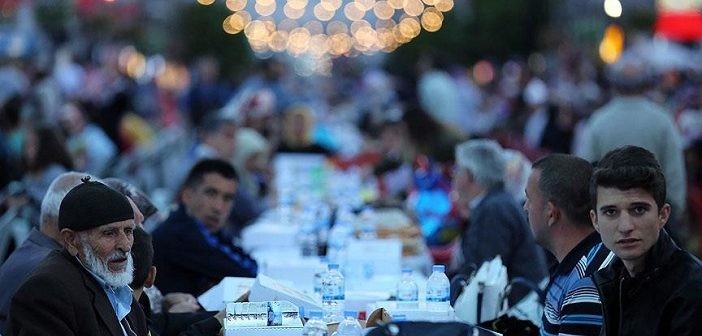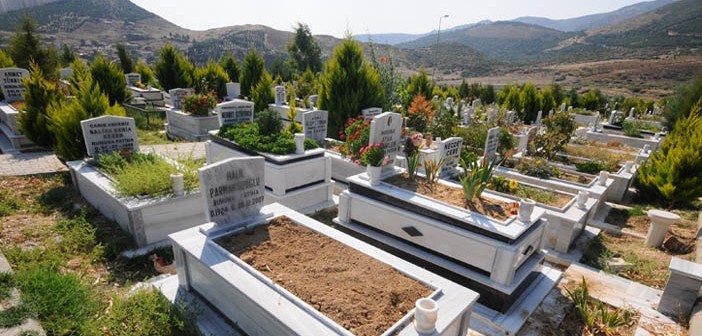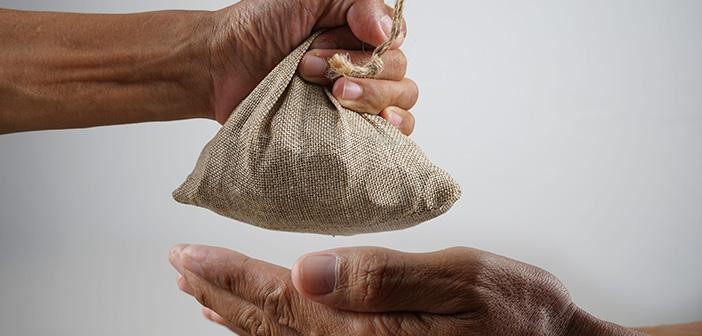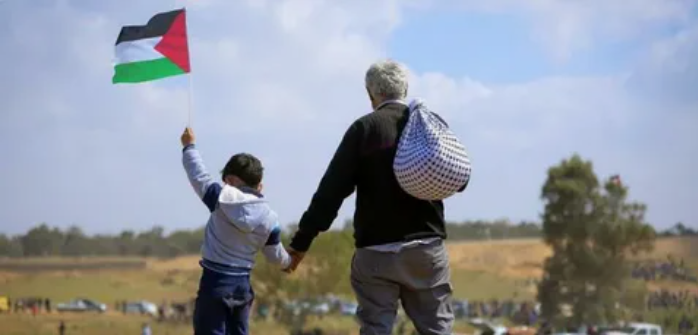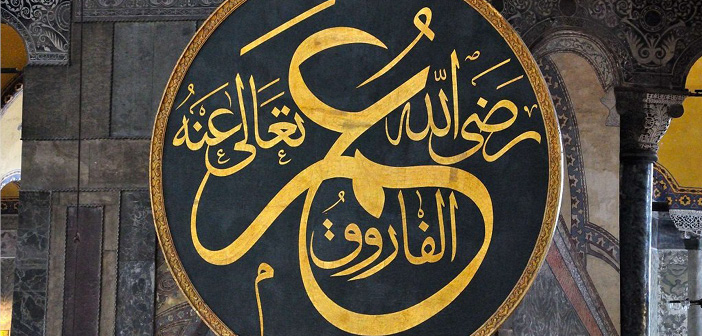
Who is Omar ibn Al-Khattab?
Who is Omar ibn Al-Khattab -may Allah be pleased with him-? Omar ibn Al-Khattab -may Allah be pleased with him- what is his biography? Here’s what you need to know about Omar ibn Al-Khattab…
Omar (r. 634-644 CE)
may Allah be pleased with him
Hadrat `Omar, may Allah be pleased with him, was an exemplary Muslim in all his dealings, and he staunchly followed the glorious way of the Messenger of Allah.
Before embracing Islam, he was a typical figure of the age of ignorance, with a ruthless and savage character. After being blessed with faith he became altruistic, self-controlled, and meticulous about the law. His harsh and brutal character evolved into a merciful and tender one.
As caliph, he was a highly responsible person who always maintained the peace of the Muslim community. He would say, “I fear that Allah may ask me about it if a sheep is lost by the river Euphrates.”[1] In the evenings he used to go around the neighborhoods of the city carrying supplies on his shoulders to help orphans and the needy. He was not satisfied in spirit until he consoled broken hearts, wiped tears from eyes, and made the downcast smile. He was so aware of what he had been entrusted with that he worked hard, day and night, to fulfill his task. Yet he was never content with his service. He was never at ease. However, he always followed the Prophet and is renowned as a just and praiseworthy caliph, for he was in awe of his responsibility.
He did not die a natural death, but was attacked by an unstable person and died of his injuries. As he lay dying, people asked him to nominate a successor. He said, “Shall I bear responsibility for you even after I die? I expect no reward for being your caliph. I only hope that my good performance of duty may balance out my bad performance. I want neither of them to overbalance the other. I will be happy as long as I am not questioned on the Day of Judgment!”[2]
When people suggested that he nominate his son `Abdullah to follow him as caliph, he said, “One victim is enough from one family!”
The basic goal of this venerable Companion was to ensure the wellbeing of the Muslim community. He forgot his own problems as he took on the community’s problems, turning them into his constant concern. He strictly followed the example set by the Prophet. He never forgot how the Prophet suffered and struggled to succeed in the way of Allah, and he followed in the Prophet’s sacred track and managed to find the right way.
Commitment and Humility
The Prophet Muhammad (s) used to sleep on a simple straw mat. Hadrat `Omar, may Allah be pleased with him, cried when he saw the print of the hard mat on the body of the Prophet. When the Prophet asked him why, he replied, “O Messenger of Allah! It is well-known that the king of Persia and the king of the Byzantines live in comfort. You deserve better, for your office is greater than theirs.”
The Prophet answered, “Would you not prefer us aim at the next world, while they aim at this one?”[3]
The most notable feature of `Omar's caliphate was the vast expansion of Islam. Along with the Arabian Peninsula, Egypt, Iraq, Palestine, and what is today Iran also came under the protection of his government. The wealth of the Byzantine and Persian empires began to flow into Medina, and the standard of living of the Muslim community began to improve. Yet `Omar maintained the same style of life that he had followed before. Though his state grew in splendor and its treasuries were overflowing, he kept on giving the Friday sermon in patched clothes. He lived a humble life to protect himself from the seduction of his lower self.
In a famous incident, when `Omar traveled to Damascus to put the new Islamic government on a firm footing after the conquest of Syria, he was accompanied by only a single attendant, and rode only a single camel. He suggested to his attendant that the two of them ride the camel by turns. The attendant rejected the offer, saying that people would be confused. Yet `Omar insisted, and made the man get on the camel. As the turns fell out, when the two of them entered Damascus, the servant was riding and the ruler was walking. This event is a concrete example of egalitarianism in Islam that has remained in the common mind of the Muslim community for centuries.
Though he governed an empire, he kept its public funds separate from his private funds. He used to get into debt and faced difficulties in life. He accepted only a small allowance from the treasury, and living on that amount, led a hand-to-mouth existence. He lived so humble a life that many visitors did not grasp that he was, indeed, the great Caliph `Omar.
Notable people among the Companions finally became impatient with his position, and wanted to increase his allowance. His character was so formidable that they held back from telling this to him directly. Instead, they discussed it with Our Mother Hafsa, who was a revered widow of the Prophet as well as `Omar’s daughter. They asked her to raise the matter with her father. When she proposed it to him, `Omar reproached her. He had seen the Prophet starving, without even a single date to eat.[4] “O daughter! How did the Prophet live?” he asked.
Hafsa replied, “He had only as much as he needed.”
`Omar said, “My two friends and I are like three travelers. The first [the Prophet] reached his place. The second [Abu Bakr] reunited with the first by following the same path. And I, as the third, want to join them. If I go over-laden, I won’t be able to catch them! Don’t you want me to be the third traveler on this path?”[5]
`Omar’s only aim was to please Allah. He was so focused upon this goal that he never felt that he was overcome by misfortunes and troubles: he had unfailing fortitude. Though the Prophet, during his lifetime, had given `Omar the good news that he would go to Paradise, `Omar always worked so as to deserve Paradise.
Omar’s Love for the Prophet
One day, during the Prophetic era, `Omar asked permission of Muhammad (s) to go on Pilgrimage. The Prophet replied, smiling, “O brother! Pray for us as well!”[6] `Omar was moved. “I was overjoyed with such a compliment,” he said. Even a hint of praise coming from the Prophet was priceless to him. The following example displays the depth of `Omar’s affection for the Messenger of Allah.
There was a Companion named Firas who loved the Prophet dearly. Because of his love, he wanted a keepsake from the belongings the Prophet. One day he saw the Prophet eating from a dish. He wanted to keep that dish for himself, so he asked for it. The Prophet, who never rejected a request, gave the dish to him.
In later days, `Omar would visit Firas at home from time to time. He would ask Firas to bring out the dish the Prophet gave him. He would pour zamzam water from the holy spring at Makka into it. The he would drink the water, and wipe his face and hands with it. He considered that it was blessed, since the Prophet had touched it.[7]
Omar, The Distinguisher Between Truth and Falsehood
One of Hadrat `Omar’s titles was al-Farûq, the distinguisher between truth and falsehood.
Allah says in the Qur’an: “O you who believe! If you are careful of [your duty to] Allah, He will grant you a distinction…” (Anfal 29). `Omar, whose heart was gripped by fear of Allah, solved problems with justice all the time by sorting the good and the evil into their appropriate places. Even his early judgments were known for their consistency with verses of the Qur’an that were subsequently revealed. This virtue of Hadrat `Omar is mentioned in one of the sayings of the Prophet: “Allah Almighty endowed the tongue of `Omar with what is just.”[8] The Prophet also said, “In earlier communities there used to be individuals who received divine inspiration. If there were such a one among my people, it would definitely be `Omar.”[9]
Hadrat `Omar, may Allah be pleased with him, was a determined man, and he expressed his determination many times. The most striking example of this concentration was an outright miracle.
One day, Hadrat `Omar was giving a sermon from the pulpit. All of a sudden he cried out, “Toward the mountain, toward the mountain!” These words had nothing to do with the topic of the sermon. But when `Omar said these words, Sariya, his commander in chief, was in the midst of a battle a long way away. He later reported that he had heard the words “Toward the mountain!” in `Omar’s voice. He turned his forces toward the mountain and was able to head off an enemy attack.[10]
By the grace of Allah, `Omar was granted divine blessing and became a monumental figure standing for righteousness and justice. In his presence, evil powers had no chance of seducing people into sin. Within his sphere of influence, there was no place for injustice and cruelty. The Prophet, therefore, said to `Omar, “I swear by Allah Almighty that if Satan encountered you, he would walk another way.”[11]
Actions Speak Louder than Words
Hadrat `Omar passed on a great deal of wisdom to guide the faithful. For example, he advised, “Do not judge anyone according to how many prayers he says or how many fasts he keeps. Judge according to whether he speaks the truth, guards what is entrusted to him, and respects the difference between lawful and unlawful.”[12]
These words of `Omar show that true prayer and fasting lead us to refrain from all evil acts. Prayer or fasting by someone who does not work to train his lower self will bring no benefit. Such prayer or fasting will receive no blessing, and so will not keep one from evil and mistakes.
Hadrat `Omar reproved certain people who stopped working for a living, claiming, “We are the people of trust in Allah.” He told them, “You do not trust in Allah, but in the property of others. The true people of trust are those who plant their seeds, and then trust in Allah.”[13]
A man was speaking in praise of someone. Hadrat `Omar asked, “Have you ever traveled with him? Have you ever been a neighbor to him? Have you ever traded with him?” The man gave negative answers to all these questions. And Hadrat `Omar said, “I swear by Allah that you do not know that man.”[14]
The most important point for the judgment of people is, as our ancestors said, that actions speak louder than words. If you build a firm character and develop a spiritual personality, the fact will make itself apparent in your interpersonal relations and your other undertakings, as well as in what you say. The quality of a person’s actions was therefore the most important principle that guided Hadrat `Omar’s approach to life.
He said, “Among people whom I do not know, the most beloved to me is the one who has a good name. Among people whom I do know, the most beloved to me is the one who has a good manner. Among people who I am examining, the most beloved to me is the one who speaks the truth.”[15]
A Life Honored by the Qur’an
Hadrat `Omar was very anxious to show respect to the Qur’an. It is said that it took him years to apply the principles he found in the second chapter of the Qur’an, Sura Baqara, to his life. When he felt that he had managed to internalize those principles, he slaughtered a camel to thank Allah.[16]
It had, in fact, been some words of Qur’an he had listened to in the house of his sister that had brought him to embrace Islam in the first place. After that, he made his best effort to grasp the meaning of the Qur’an and to live his life accordingly. The endeavor gave him great pleasure. Thus he became a staunch follower of the Qur’an and the sunna of the Prophet. Since he lived a life full of Islamic wisdom, he has become a role model for vast numbers of Muslims.
When Hadrat `Omar died, `Abdullah ibn Mas`ud (may Allah be pleased with him) said in great sorrow, “Nine out of ten of the learned folk now have gone.”
Some Companions who heard him objected, “Among us we have other learned folk!”
He replied, “I am talking about the learned who have spiritual wisdom!”
Hadrat `A’isha also spoke well of `Omar to the Companions. She advised, “Adorn your circles by saying words of respect to the Prophet and mentioning Hadrat `Omar.”[17]
Hadrat `Omar interpreted the morality of the Prophet with wisdom and steadfastly endeavored to serve the way of Allah. Here are some words of wisdom from him.
Words of Wisdom from Hadrat `Omar
“It is easier to stop sinning than to continue repenting.”
“The one I love most is the one who tells me my faults.”[18]
“The one who speaks most, makes most mistakes. Whoever makes many mistakes loses his sense of embarrassment about them. Whoever loses his sense of embarrassment about errors does not think twice about what Allah forbids and what He permits. Such a person’s heart is deemed to be spiritually dead.”
“If I were capable of knowing the future, I would bear witness about five kinds of people who will go to Paradise. They are a poor person with many children who remains patient and thanks Allah; a wife who pleases her husband; a wife who voluntarily returns her marriage gift to her husband; a child that pleases its parents; and a sincere penitent.”
“I have seen all kinds of friends, but I have not found any better friend than watching your tongue. I have seen all kinds garments, but I have not found any better garment than chastity and abstaining from forbidden things. I have seen all kinds of wealth, but I have not found any better wealth than satisfaction with what you have. I have seen all kinds of favors, but I have not found any better favor than advice. I have seen all kinds of food, but I have not found any better food than patience.”
“Making friends is half of intelligence. Asking questions is half of knowledge. Taking measures is half of life.”
“This world is nothing when compared to the next. It is nothing more than a rabbit’s jump.”[19]
“Whoever avoids empty talk is granted wisdom. Whoever avoids nosiness is granted modesty. Whoever avoids the taste of food is granted the taste of prayer. Whoever avoids frivolity is granted grandeur. Whoever avoids foolishness is granted honor. Whoever avoids the love of this world is granted the love of next world. Whoever avoids bemoaning other people’s faults is granted the ability to correct his own faults. Whoever avoids prying into the secrets of Allah’s transcendent attributes is granted a chance of staying clear of doubt.”
“Ten things do not ripen without another ten: intellect without chastity; virtue without knowledge; salvation without fear; government without justice; dignity without decency; comfort without security; wealth without misfortune; poverty without frugality; sovereignty without humility; effort without divine guidance.”
“One who does not show mercy is not shown mercy. One who does not forgive is not forgiven. One who does not keep away from sins cannot reach the level of full submission to Allah.”[20]
“Prayer hovers between earth and heaven. It does not ascend until the Prophet is praised.”[21]
“Let only those who are knowledgeable sellers of religion trade in our market.”[22]
“Praising someone to his face is like slaughtering him.”[23]
Hadrat `Omar wrote to his governors, “To me, prayer is your most important work. He who observes prayers in time will keep his religion. He who does not observe prayers will lose his religion soon.”[24]
Qadi Shurayh wrote to Hadrat `Omar asking how he should judge. Hadrat `Omar answered, “Judge by what you find in the book of Allah. If you cannot find a reference in it, go to the practice of the Prophet. If you cannot find a reference in the two, then judge by the principles displayed by righteous servants of Allah. If you still cannot find a reference, either make up your mind yourself or stop there. If you ask me, the second is better for you.”[25]
“Prosperity and poverty are both bridle-paths. I do not care which one I take.”
“The most intelligent person is the one who judges human actions well.”
“I can tell a person’s level of intelligence by the questions he asks.”
“Do not put off today’s work until tomorrow.”
“Once a task is postponed, it is difficult to move it forward again.”
“One who does not know what the Devil is easily falls into the Devil’s trap.”
“Do not incline to the world. Then you may live freely, unenslaved by your ego.”
“If you do not live what you believe, you will begin to believe what you live.”
“You cannot manage to correct people unless you correct yourself.”
“The most ignorant of men is the one who throws away his own afterlife for the worldly advantage of others.”
“The noble side of a favor is to do it without delay.”
“The hidden witness of an evil act is our conscience.” (A man asked the Prophet what was evil. He replied, “Turn to your heart to find out what is evil! Good rejoices the heart, and your heart will call upon you to pursue it. Sin creates anxiety and unease in the heart, even if other people call upon you to pursue it.[26])
“One who conceals his own secret can manage himself.”
“Try to be powerful without violence, and to be gentle without weakness.”
Hadrat `Omar, with all his spiritual wisdom and insight, used to pray, “O Allah! I seek refuge with You not to carry me away suddenly, not to let me go astray, and not to count me among the careless!”[27]
Every night it was Hadrat `Omar’s private observance to question himself closely about what he had done that day.[28] We would profit from following this custom in order to spiritually train ourselves. We might well take upon ourselves the practice of Hadrat `Omar and ask ourselves every night, “What have I done in the Way of Allah today?” Muslims need to be careful not to be ignorant of our worldly and otherworldly missions. We should question ourselves about these well in advance of our final questioning by Allah.
May Allah help us to render an easy account of our life on the Day of Judgment! May Allah help us to live a life adorned with good deeds and deserving of eternal blessing in the Hereafter! May Allah grant us the special attribute of Hadrat `Omar, known as al-Farûq, and permit us to distinguish between truth and falsehood.
Amîn…
[1] Ibn Abi Shaybah, al-Musannaf, VIII, 153.[2] Muslim, al-Imarat, 2.[3]Muslim, al-Talaq, 31[4] Muslim, al-Zuhd, 36.[5] Sehbenderzade Ahmed Hilmi, al-Tarh al-Islam, I, 367.[6] al-Tirmidhi, al-Da`awat, 109; Abu Dawud, al-Witr, 23.[7] Ibn Hajar, al-Isabah, III, 202.[8]Tirmidhi, al-Manaqib, 17/3682.[9] Bukhari, al-Ashab al-nabi, 6.[10] Ibn Hajar, al-Isabah, II, 3.[11] Muslim, al-Fada’il al-sahabah, 22.[12] al-Bayhaqi, al-Sunan al-Kubra, VI, 288; al-Shu`ab, IV, 230, 326.[13] Ibn Rajab, Jami` al-`ulum, I, 441.[14] al-Ghazzali, al-Ihya’, III, 312.[15] Ibn al-Jawzi, al-Manaqib, 219.[16] al-Qurtubi, al-Jami`, I, 40.[17] Ibn al-Jawzi, al-Manaqib, 276.[18] al-Suyuti, Tarikh al-khulafa’, 130.[19] Ibn Abi Shayba, al-Musannaf, VIII, 152.[20] Bukhari, al-Adab al-Mufrad, p. 415, no. 37.[21] Tirmidhi, al-Witr, 21.[22] Tirmidhi, al-Witr, 21/487.[23] Ibn al-Qutayba, al-Masa’il, p. 14.[24]al-Muwatta, al-Wuqut al-salat, 6.[25] al-Nasa`i, al-Qudat, 11/3.[26] Ibn Hanbal, IV, 227-228.[27] Ibn Abi Shayba, al-Musannaf, VII, 82.[28] al-Ghazzali, al-Ihya’, IV, 728.
Source: Osman Nuri Topbaş,Principles from the Lives of the Four Rightly-Guided Caliphs, Erkam Publications
Who is Abu Bakr?
Abu Ayyub al-Ansari: The Flagbearer of the Blessed Prophet





